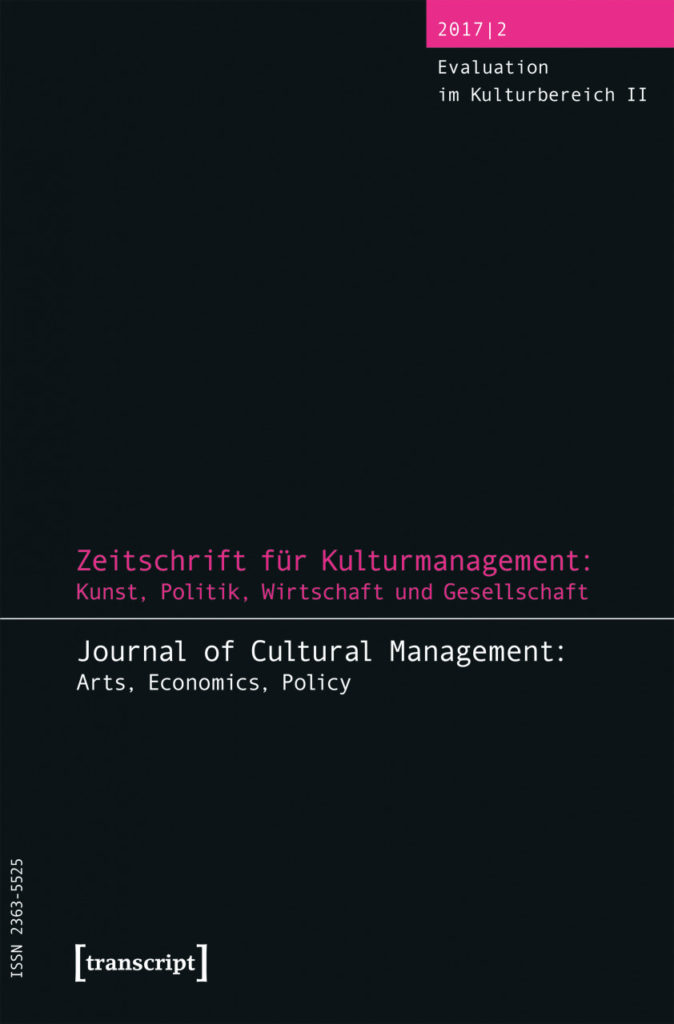Research Article
The role of culture in development
From tangible and monetary measures towards social ones
Abstract
Along with the debate on the role of culture in development and the consequent establishment of culture-based local strategies, a significant number of impact evaluation studies have been produced to demonstrate culture’s instrumental function. This article explains that the rationale behind this impact research has been biased towards economic appraisals, and it advocates bringing social and intangible dimensions, beyond the tangible and monetary ones, into the debate. This change can highlight the mechanisms through which culture and the arts can enrich societies and individuals. In doing this, and on the basis of a literature review, the article presents the current practices in social impact assessments of cultural activities, by describing the type of documents identified, the project beneficiaries and providers, the contexts in which assessments take place, the cultural inputs and artistic forms that drive the potential effects, the main impact areas covered by the studies, the time frame for the impact analyses and the methodological approaches. Moreover, it stresses the complexity and constraints of conducting social impact appraisals, arguing that these challenges might also keep researchers away.
Keywords
2017 (2)
Evaluation im Kulturbereich II

Related Articles
Yearbook for Culture Management 2010
Essay
Evaluation im kulturpolitischen Wirkungsbereich
Grundprobleme und HerausforderungenJournal of Cultural Management 2017 (1)
Research Article
Covid-19 and Ballet Production in Japan: The Impact of the Crisis
Journal of Cultural Management and Cultural Policy 2024
Essay
Die Thüringer Kommunen und die Bürde der Kultur
Journal of Cultural Management 2015 (2)
Research Article
Yearbook for Culture Management 2013
Research Article
Journal of Cultural Management and Cultural Policy
Essay
© 2026, Journal of Cultural Management and Cultural Policy
Keywords
- Aesthetics
- Higher Education
- Cultural Diplomacy and Foreign Cultural Policy
- Occupation
- Career and Professional Role
- Audience Development
- Audience Studies and Visitor Studies
- Visitor Motivations
- Business
- Covid Pandemic
- Democracy
- Digitalization
- Diversity
- Third Sector
- Empirical Aesthetics
- Development
- Ethics
- Evaluation
- Field Theory
- Festival
- Film
- Federalism
- Community Arts
- Societal Change
- Ideology
- Staging
- Career
- Communication
- Concert
- Creative Industries
- Creativity
- Crisis
- Culture
- arts organizations, cultural organizations
- Cultural Participation
- Cultural Change
- Fincancing The Arts
- Cultural Promotion Law
- Cultural History
- Cultural Management
- Cultural Economy
- Cultural Organizations
- Art Education
- Cultural Policy
- Cultural Production
- Cultural Sociology
- Art Education
- Cultural Understanding
- Arts Administration
- Cultural Industry
- Cultural Sciences
- Art
- Art Field
- Arts Research
- Artists
- Artistic Research
- Artistic Reputation
- Arts Management
- Arts Organizations
- Art education
- Arts Marketing
- Arts Administration
- Curating
- Leadership
- Literature
- Advocacy
- Management
- Marketing
- Market
- Media
- Methods Development
- Mexico
- Monumentalizing
- Museum
- Music
- Non-Visitor Studies
- Opera
- Orchestra
- Organization
- Political Expression
- Post-truth Politics
- Professional Role
- Audience
- Audience Development
- Law
- Government
- Role
- Socially Engaged Art
- Social Cohesion
- Social Change
- Social Cohesion
- Non-visitor Socio-demographics
- Socioculture
- State
- Symbolic capital
- Dance
- Participatory Justice
- Theatre
- Theatre Governance
- Theory Development
- Tourism
- Transformation
- Survey
- Entrepreneurship
- Urbanism
- Civil Society


